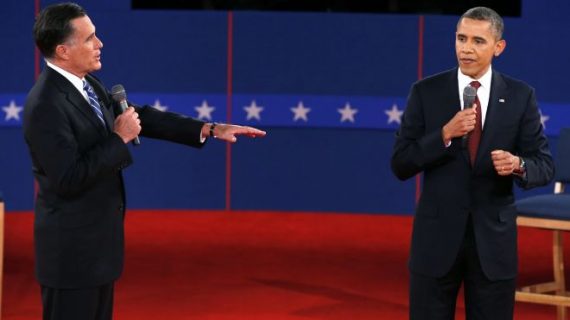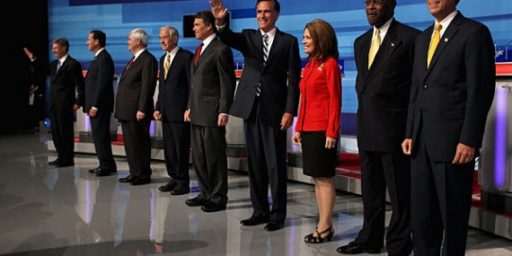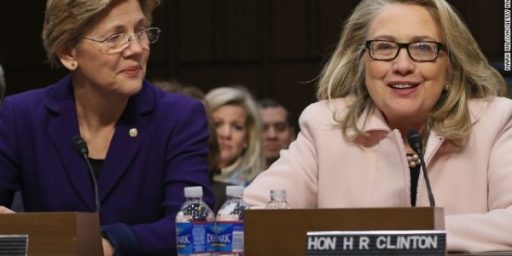Do We Really Need A “Foreign Policy” Debate?
Does it make sense to divide the Presidential debates between "domestic policy" and "foreign policy?" Yes, and no.
Ezra Klein argues that it doesn’t make sense to divide our Presidential debates into “domestic policy” and “foreign policy” categories:
The first presidential debate focused on “domestic policy.” Tonight’s presidential debate will focus on “foreign policy.” I’m going to focus on the fact that this distinction is ridiculous.
Washington’s definitions of “domestic policy” and “foreign policy” haven’t kept up with the real world. When you hear the term “domestic policy” in the Beltway, it means economic policy, health-care reform, financial regulation, energy. “Foreign policy” means, broadly speaking, our policy towards the countries we are already at war with, or are considered likely to eventually go to war with. But the actual policies don’t break down so neatly.
“The domestic/foreign distinction is completely misleading,” says Heather Hurlburt, director of the National Security Network. “It keeps you from having intelligent conversations. There’s a whole set of issues that structurally don’t get seen if everything is a domestic or a foreign issue.”
At the first debate, the very first question was about “jobs.” So jobs are a domestic issue, right?
“That debate was bizarre,” says C. Fred Bergsten, director of the Peterson Institute for International Economics. “There was nary a question about how the world economy affected the U.S. economy. Yet we all know the Euro crisis is the number one threat to the world economy and the U.S. economy.”
Or take financial regulation, which also came up in the first debate. The candidates argued over who would do what with the Dodd-Frank financial reforms. Yet if you talk to the people trying to implement those reform - or any reforms - they’ll tell you that an enormous amount of their time and energy goes into coordinating with other countries and worrying about foreign firms.
“Capital markets are the most globalized of all,” says Bergsten, “so it’s folly to think you can truly regulate financial stability unless you do it on a global basis. When Barney Frank was writing Dodd-Frank, he said the reason they were leaving a lot of big issues open was to promote a maximum degree of international compatibility.”
The piece goes on in a similar vein.
I understand the point that Klein is making here. We live in an interconnected world and that what we considered “domestic” issues — jobs, the economy in general, the future of economic growth, our financial system, and related issues — are heavily influenced by things that happen overseas. That’s been the case for some time. However, when these debates get divided by general subject matter like this, I don’t think it’s intended to mean that the candidates cannot mention international issues that impact things here in the United States. Indeed, I seem to recall both candidates doing exactly that in the first “domestic issues only” debate and in last week’s “Town Hall” debate in response to questions about domestic policy. Indeed, it’s rather difficult to have a conversation about American competitiveness without discussing International Trade issues and, as Mitt Romney is wont to do, China. On the other side of the coin, there are many domestic issues that influence “foreign policy” questions, not the least of them being the fiscal problems that our nation is having and the question of what, if any, international commitments might need to be scaled back in order to bring our budget under control.
However, I think that Klein is overreacting somewhat here. The number of of issues that a President has to deal with are innumerable, but the number of debates that get held during a General Election campaign is limited. For many reasons, I think that our current system of three Presidential debates and one Vice-Presidential debate is the high end of what we’re likely to ever see. Part of this is a matter of sheer practicality. Given the size of the country and other considerations, the idea of having more debates than these is probably impractical. Additionally, a debate that lasts longer than 90 minutes is likely to be one that drags on far too long to begin with. For that reason, it makes some degree of practical sense to divide the topics of these debates to some degree so that the candidates have time to actually discuss issues in something other than sound bites. “Domestic Policy” and “Foreign Policy” are such open ended topics to begin with that it would seem to me that creating an open ended debate format where any topic could be discussed would end up being a confusing waste of time. Indeed, the “Town Hall” debate has exactly that format and it has consistently been the least informative of all of the Presidential debate formats going all the way back to its introduction in 1992.
So yes, Ezra Klein is right to lament the sometimes artificial division between “domestic” and “foreign” policy, but as a practical matter for organizing debates it strikes me that the divisions work out just fine.






The reason it doesn’t matter is NOT because foriegn and domestic policy are linked, but because America is stupid.
We cannot handle a complex conversation about the Eurozone crisis
Instead we’re going to get 20 minutes of arguing over how many minutes it took Obama to use the word “terrorism” instead of the word “terror” or some other BS
My question is what would be their policy concerning the communist bloc.
I think we should forgo debates and replace them with reality show like tests. Can they use a waterpistol and a bucket water (with a hole in teh bucket) to force a ball across a line at 10 meters?
/end sarcasm
It is doubtful that either Romney or Ryan could find Kabul on a map if you spotted them the “K” and the “A”. But unless Romney pees on the floor tonight and tells Obama to wipe it up – or suggests that he will appoint Jack Ryan as CIA Director if he is elected, then he will be perceived the “winner” of the debate on a subject on which he is totally clueless. So I will be switching between seeing the Lions win and seeing the Giants win.
With a different moderator this could be quite interesting. How about if Juan Cole, Dan Drezner, Danlel Larison and James Joyner were part of the panel moderating the debate? I can’t see it being less boring or informative.
Every question in every debate so far has been asked from a right wing talking point point of view. No questions for Romney on Romneycare, no questions on abortion, no questions on climate change, no questions on outsourcing and offshoring, tax havens, releasing tax returns. In other words, every question is framed in a way to give Romney equal footing on issues, when his positions are well in the minority.
I expect more of the same tonight. Along with the requisite attacks on Schieffer, who is already biased to the right, but will be labeled a liberal after tonight.
Of course the one is inseparable from the other in reality. And Americans aren’t any stupider than any other nationality. Humans, in general, have a tendency to compartmentalize things in order to grasp them. A debate that covered foreign and domestic policy, and all the ramifications of each, would last about five hours minimum, and by the end of it, the two candidates would be talking to an audience of ten, if they were lucky.
@Ed in NJ:
Martha Radditz asked about abortion in the VP debate.
Although I can’t for the life of me figure out why. It’s not really relevant to a Presidential election.
@CSK:
Not only that, I doubt any modern politiician would be willing to comply with the format of the actual Lincoln-Douglas Debates.
@bk: The Jack Ryan idea is not bad – Harrison Ford might actually be a good choice. When it comes to foreign policy knowledge and expertise, these two don’t hold a candle to Kennedy, Johnson, McNamara, Mac Bundy, Kissinger, Rusk, and the best of all: Richard M. Nixon.
@David M: My choice for moderator and one that makes sense is: Alex Trebek. That is is cool, fair, and firm. He would keep order and keep things on time.
doug:
Presidents pick Justices and a lot of people care about Roe v. Wade.
I am not really certain 3 debates are needed, but it seems like having a strictly foreign policy debate doesn’t make sense either. I think all debates should be a mixed bag because rarely are things not interconnected.
@jukeboxgrad:
I think Doug was engaging in a little irony.
Oops, then I better adjust my irony detector. With Doug sometimes I find it hard to tell. It might have something to do with Poe’s Law.
@Doug Mataconis:
Yes, but she asked about it from the perspective of “Oh, you poor Catholic men! You have a bunch of old virgin men in red beanies telling you one thing, and you have the laws of the state and the desires of half the species on the other, how oh how did you brave men decide what to think?” They weren’t asked to speak about how their proposed policies would affect women, they were asked to talk about their personal feelings, as men who will never have to worry about having an unwanted pregnancy, or have to worry about dying because their Catholic hospitals refuse to give them abortions to save their lives.
Hint: that’s a conservative slant. A liberal slant would have been one that didn’t take for granted that the feelings of rich straight white men are far more worth talking about than the lives of everyone else.
@Carson: ” When it comes to foreign policy knowledge and expertise, these two don’t hold a candle to Kennedy, Johnson, McNamara, Mac Bundy, Kissinger, Rusk, and the best of all: Richard M. Nixon.”
Ah, yes. the Best and the Brightest. Men so smart they could be trusted to safely sail the ship of state and never steer us into a completely unnecessary war built on a fraud and maintained for fear of being called weak.
Probably won’t even talk about the Eurozone problems but instead more Libya Zzzzzzzzzz.
@David M:
Exactly !
I think the character Bruce Willis played in “Last Man Standing” (John Smith) would make an AWESOME moderator…
http://www.imdb.com/title/tt0116830/
Seriously. see it.
@jukeboxgrad:
Which is an entirely different issue from asking them their personal opinion about abortion or, as Radditz did, how that opinion comports with their Catholic faith.
@Jc:
Not an unfair point, but what real influence does an American President have on what’s going on in the Eurozone? That strikes me as a European problem that Europeans are going to have to solve
I agree with your perspective on this.
@Carson:
You mean the idiots who managed our policy in Southeast Asia between 1960 and 1973? Yea, that worked out just fine. No, wait, it didn’t.
The reason we need to devote one debate specifically to foreign policy is that without doing that the candidates would barely talk about anything outside our borders at all. Considering that the president’s strongest powers are in foreign policy that seems like a serious omission.
@Dave Schuler:
I quite agree. The Israel/Iran question isn’t economics, and economics isn’t everything.
Foreign policy is determined by domestic political opinions. Witness how a group if Cuban ex-pats have led the country around by the nose on Cuba because the live in a swing state. How the Evangelicals have sworn allegiance to Israel. How we have been led to fear anything vaguely “Arab” or “Muslim” in order to make us easy to manipulate.
I’d like to add a thought about deploying Ezra to some 3rd world s-hole for a year and seeing if his opinion has changed, but every one that springs to mind is too loaded with unnecessary adjectives.
@Doug Mataconis: True, but they are going to talk about middle east problems that middle easterners really need to solve. Another absence might be north Korea, werent they a big deal recently?
@Doug Mataconis:
True enough, but to channel jc, and you would probably agree, it’s something that should at least be acknowledged in a presidential debate on foreign policy. Foreign affairs doesn’t only come down to the middle east and China, and it’s detrimental to the electorate to suggest otherwise
So last night Romney showed just how cynical he is and moved to the left of Obama on Foreign Policy…banking on the fact that America is far too ignorant to notice, and that his base is far too un-principaled to care. He’s right on both counts. If you are voting for Romney…which are you?
In any case…get used to saying President Romney.
@C. Clavin:
Until the polls in Ohio, Wisonsin, and Iowa show that Romney has turned the tables I’m not willing to utter those words. Yes it is disheartening to see a candidate play on the ignorance of the majority of voters but that will not matter if Obama wins those states.
@ LaMont…
Disheartening? It turns my stomach to think of this shape-shifting grifter being the CIC.
Unfortunately we are surrounded by low-information voters like Doug and Jan and Florack…who buy this guys crap…mathematically impossible economics and arresting Ahmadinejad…by the buckets full. Lying doesn’t matter…as long as it’s your team doing the lying.
I hope the voters of the swing states are smart enough to save America from itself. I just can’t see it right now.
I missed last night’s debate. According to news accounts this a.m. Obama was aggressive and somewhat confrontational whereas Romney was passive and conciliatory. If that’s true then you don’t need a ouija board to know what the internal (i.e., actual) polling is telling the candidates. People in the lead act like they’re in the lead. People who are behind act like they have ground to make up. It’s really that simple.
That aside, with the steady disintegration of Zombieland into a state of de facto catatonia the more germane question in years to come will be whether we even need to have debates.
Concerning foreign policy the political reality is that in the post-’72, post-Carter universe there simply can’t be all that many major differences between Democrats and Republicans. Democrats no longer are dumb enough politically speaking to give anything more than slight lip service to the batty left wing. Hell, within a few months of assuming office Obama himself got mugged by reality and basically morphed into George W. Bush II. Not that it doesn’t matter who holds the presidency. It does. There are at the margins various key differences. Spending priorities. Alliance priorities. Trade policies. They do add up.
@C. Clavin:
Calm down dude. I feel your pain. Trust me, I’ve been there. After watching that debate, then watching CNN afterwards, I remembered telling myself to stay as far away from politics until election night becuase things were going to get really silly between now and then. When you have a candidate in Romeny that has outright lied about almost every significant position he has held for the last year, then to hear media outlets (CNN) that care more about the competitiveness about the race rather than championing the substance and facts to actually inform the voters you get this silly enviroment in which voters are INTENTIONALLY kept ignorant. That does more harm to all of us rather you lean left or right the only thing I would recommend to you is that you take a break from this for a day or two. Its works for me – got to get it out of your system. It literally bogs you down.
@Tsar Nicholas:
You probably shoould have watched the debate becuase this simple critique is not representative of the context for which Romney was passive and Obama was aggressive.
first of all, lets be clear, Obama iwas the one leading in the polls and Romeny, the one trying to gain ground before this debate.
Romeny was passive because his internally polling probably indicated that being this macho agressive candidate on foreign affairs (which he was/is during his campaigne) does not sit well with the majority of voters who believes that inciting another war is not the best way to go.
Obama was aggressive in pointing out Romney’s flip-flops which he did not do in the first debate, did in the second debate, and continued to double down on in the third debate. This is exactly what Romney felt he had to do to turn the tables ,and this is what Obama felt he had to do to hold his numbers, particularly in the battleground states..
@ LaMont…
That’s probably good advice.
Unfortunately the prospect of electing someone who will do more damage than even Bush43…both in terms of policy, and from a big picture view…will not allow it.
Obama put it well…on almost every policy issue Romney has been wrong (right up until he flip-flopped positions)…the Auto Industry Loans and killing OBL are prime examples.
But far more importantly electing Romney will reward the most cynical politics imaginable…the idea that ratcheting up fear and xenophobia, and pursuing unmatched legislative obstruction (holding up nominations, record numbers of filibusters, and forcing Democrats to pass legislation on party-line votes) is an acceptable form of behavior from our elected officials….is downright destructive to our Republic.
A vote for Romney is a vote for the worst America has to offer.
@C. Clavin:
Totally agree. With all the obstruction, I saw this potential way back by the end of 2010. Romney becoming president would endorse every iirational and unpatriotic act of congress (who has the lowest approval rating ever). The message it would send about our state of political affairs would be absolutey devastating to the credibility of this country. What can you say? You keep on living!
lamont:
Yes, those and Nevada look like the states to watch. I think the best, simplest summary of the electoral college situation is this statement from Nate Silver:
I notice that suddenly a bunch of other people are saying essentially the same thing. I guess the current numbers strongly support that analysis. In all those four states, Mitt has never had a lead in the RCP average. And Obama only needs either IA or NV, not both of them. And Obama’s current lead in all those states is at least 1.9 (in the RCP average).